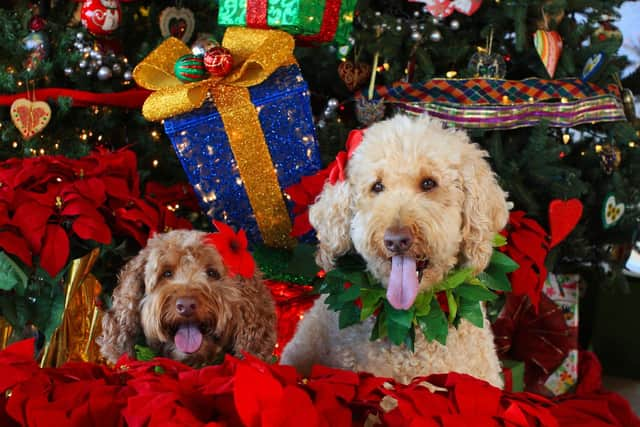Christmas Dinner For Dogs: Here's the perfect festive feast to serve up to your adorable dog - and what to avoid 🐶
While some foods us humans enjoy feasting on during Christmas Day shouldn’t be added to dog bowls – others are perfectly fine for pets to enjoy.
Companies like online pet food experts Dragonfly Products actually produce meals tailored specifically for pooches to enjoy on December 25.
Advertisement
Hide AdAdvertisement
Hide AdBut even if you just want to give your loyal pup scraps from the table, you can be sure your pet will enjoy the extra tasty treats.
Here are the perfect festive food choices for a canine three course with sides – and what to avoid.
Starters
Fish and seafood are a popular choice for a Christmas Day starter, with the 1960s classic prawn cocktail still one of the most common first courses. If you are planning a fish-based option as part of your festive menu, prawns are the perfect addition to a dog’s meal, as they contain high levels of protein and benefit from skin and joint health.
If you are planning a cheese-based starter, such as baked brie, it is best to avoid sharing too much with your dog, as dairy can be hard for some dogs to digest and is high in salt and fat.


Main course
Turkey is a staple of the Christmas Day dinner, taking centre stage during the main course. However, if you plan to carve into a boned bird, it is important to keep it out of reach of pups, as sharp meat bones can cause severe internal damage. If you can’t resist giving them a morsel, ensure the meat you give them is free of bones and the skin has been removed – the skin is much too fatty for your dog, while the bones can cause internal damage.
With these important caveats, plain, white meat turkey with no bones is a safe Christmas treat for pups and can be added to their bowls. In moderation Yorkshire puddings are also fine.
Sides
Pigs in blankets are another dinner staple, but proceed with caution if you are planning to sneak one to your pup - bacon, in particular, is exceptionally high in fat. Pork products should only be fed as a Christmas dog treat if it’s a lean cut and always ensure that it’s properly cooked.
Vegetables, and particularly sprouts, are often the items that many people will try to pass to pups to avoid having to eat them - the good news is that most vegetables that make it to a Christmas dinner plate are completely safe for dogs to eat. However, if you plan to palm off your sprouts under the table, make sure that there is no stuffing on the food you are sharing. Most types of stuffing contain onion, which is toxic to dogs. Along with sprouts, mashed sweet potatoes, carrots, parsnips, broccoli, peas and spinach are all safe for dogs.
Dessert
Advertisement
Hide AdAdvertisement
Hide AdUnfortunately, desserts are the course that dog owners need to take the most caution over, as many traditional puddings can be harmful to pups. Mince pies, Christmas cakes and Christmas puddings are all packed with raisins and currants, which can cause kidney failure in dogs, as do walnuts - so any puddings that feature them should be avoided.
Chocolate is also a dangerous food for dogs, so make sure the festive yule log is kept at paw's length. If you think your dog has digested chocolate or any other potentially toxic food it’s best to take your pet to your local emergency veterinarian as soon as possible.
Instead, why not serve your dog up some tasty pumpkin, or smear some peanut butter (but make sure it doesn’t contains xylitol, as this is toxic to dogs) onto a chew or dog biscuit to create a healthy and tasty pudding.
There are also plenty of recipes online to create dog-friendly ice lollies using a range of healthy fruits.
When it comes to the cheeseboard, small amounts of swiss, mozzarella, and cheddar cheese are safe options, but steer clear of high fat blue cheese, goat cheese, and feta, which dogs can’t digest properly.
Comments
Want to join the conversation? Please or to comment on this article.